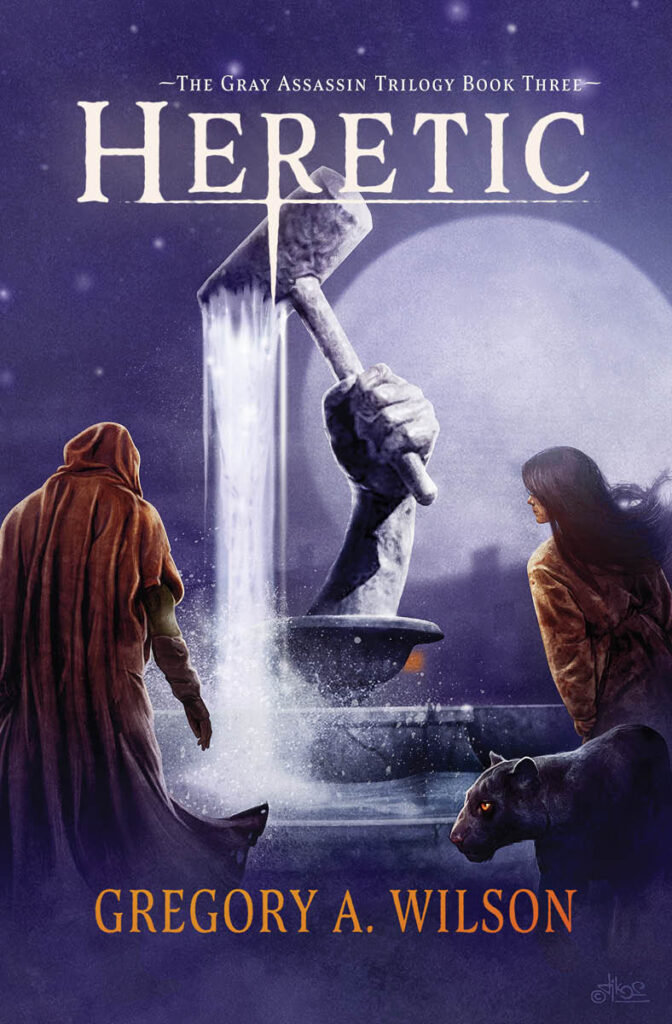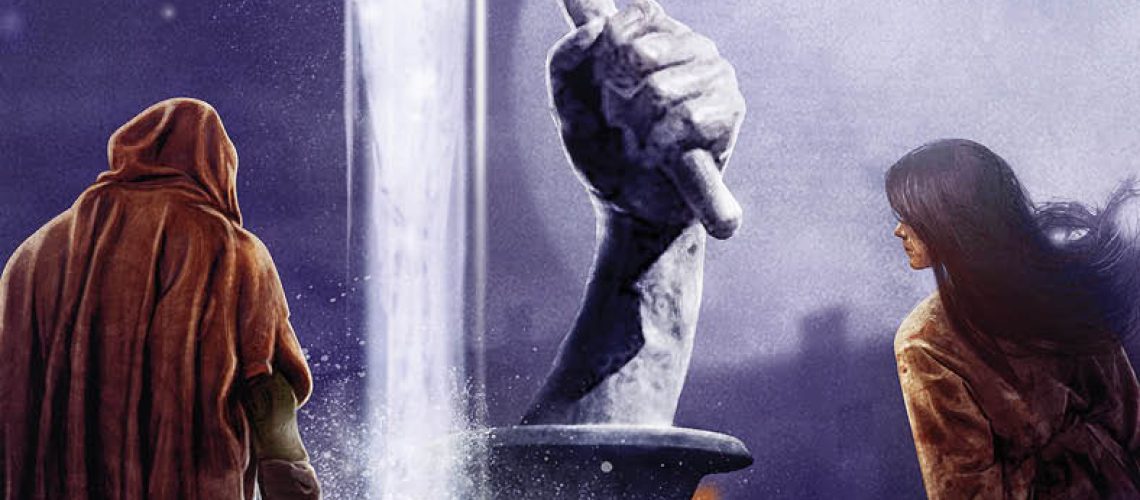Heretic, by Gregory Wilson, completes the Gray Assassin trilogy (Grayshade, Renegade, and now Heretic)
Last time in the Gray Assassin Trilogy, Grayshade had walked across a continent, tangled with deadly dangers in the marshes, opposed an enemy force, acquired allies, and gained the conviction and direction of where to go — Tellisar, the greatest city on the continent.

In Heretic, Grayshade, Caron, Rillia (and yes, Caoes the panther) have been in Tellisar for a few weeks, trying to find the Order of Argoth. They know it has a strong base here (based on the events of Renegade) and undoing it is Grayshade’s priority and plan. But Tellisar is a big and unfamiliar city and along the way he is going to make allies, more enemies and finally come to final terms with himself, with Caron and their abilities, and just what his future and life should be, all under the Sword of Damocles hanging over him that is the Order. With plenty of action beats and adventure in the bargain.
In many ways, Heretic harks back to the urban City-State Fantasy setting that made Renegade so remarkable, although it goes Bigger and Larger. Cohrelle appears to be a baby brother in terms of cities to Tellisar, and in fact Grayshade’s origins in such a smaller city makes him regarded as being from the sticks by natives and those more familiar with the Big City. Grayshade may have defeated the Order in his world’s version of Minneapolis (or maybe even Cedar Rapids) but now it’s time to go to New York.
And indeed, Tellisar is described and developed as a trading hub, a place where you can buy and sell anything. It’s a city that now runs on money and those with money have power and use that power. It’s a quite different and new environment for Grayshade and his family, and the opening of the novel shows just how much Grayshade is struggling in a new environment (which of course we also saw in Renegade, but it feels different here). Caron’s powers continue to develop, and the conflict between Grayshade and the Order slowly comes to a head.
The novel, like the previous books, is nearly exclusively in Grayshade’s point of view, with occasional breaks, particular to put us in the heads of his antagonists. This does solve some plotting problems, and also helps humanize and make his opponents more three-dimensional. They are evil, no doubt, but we have a better sense of their goals and motives whenever we break from Grayshade’s perspective.
The novel underlines and leverages the strength Wilson has shown in the previous volumes. Grayshade sings in the action beats, with some excellent chase scenes, battles, and some well described and intensely written descriptions when Grayshade is on the move. This remains the strongest element of his work. I would argue that a large part of the pleasure of reading Heretic, as well as the other novels of the Gray Assassin Trilogy, is for these action sequences.
In addition, as in the previous novels, Grayshade being a person in a community, with bonds, connections, friends and more is still a strong “take that” to novels where the hero strides across the landscape caring about no one and nothing. And like its predecessors, with a protagonist with strong introspection (to say nothing of deep conversations), Heretic is a deeply thoughtful and philosophical book as well.
However, unlike Cohrelle, I don’t feel that Tellisar cohered for me as a living location quite as well as a city. There are some lovely bits here and there and some interesting speculative worldbits here and there, but overall I have a far less good feel for Tellisar as a “character” in the story than I did for Grayshade’s home city. I don’t think Heretic really is a book for people who are looking for that “city as a character” sort of aspect to their fantasy fiction. I think Wilson does the scene setting in miniature very well, in set pieces, but a grand vision of the city is something that doesn’t play to his strengths. (The intimate scene setting of course plays right into his strength at action sequences, mind).
Since Heretic ends a trilogy, I want to now talk more directly about trilogies now and what they do. The trilogy format may have originated in Tolkien (and that itself was just an accident of the vicissitudes of publishing), but there is a form to most trilogies. Book one introduces our protagonist, their ultimate antagonists, sets our table and lays our ground rules. The novel may or may not follow Diana Wynne Jones’ Tough Guide to Fantasyland standard hero quest narrative. There may or may not be a “sub boss” involved here. If the first novel is written well, it has a satisfactory conclusion to the immediate problem but has a “and the story continues vibe” as the remainder or the real revealed threat happens.
The middle books of trilogies are, paradoxically, the hardest for writers to get right. You aren’t in the first novel, but you can’t conclude the series, either. You can try and repeat with another “sub-boss” or “sub-problem” but that can feel repetitive. Middle novels are often a lot of treading water and are hard to pull off. (This may be one of the reasons why duologies seem to be more in fashion these days. No mushy middles).
The third book in the trilogy is intended to resolve things, as far as they are going to be resolved (if this is going for an open ended series, enough to complete this trio). Character growth, inward and outward, comes to a completion. No matter how happy the ending is, or not, the writer needs to wrap it up.
It’s a well worn form, and the Gray Assassin trilogy fits right in it. Grayshade introduces our character, his essential conflict when he comes into conflict with his orders and his whole way of life, and sets up his antagonist in the organization that formerly defined his life. He wrecks said organization in his home city of Cohrelle and prepares to go on the road. This is a first novel in a trilogy that follows and hits the needed marks, including the “off ramp” for readers who don’t want to continue on.
Renegade as a middle volume of the trilogy sends Grayshade and his found family on the road across the continent. New allies, new adversaries, some answers, and lots of action. And it gives the big signpost to Grayshade heading to Tellisar (the aforementioned setting for Heretic). Renegade meets the expectations of a middle book in a trilogy. (I think the whole Caoes plotline and story is a strong part of the reason why it succeeds.)
And so we come to the ending, Heretic. This has the job of being the anchor leg of the trilogy and bringing not only the plot, but given the nature of the writing, the character themes of the series, to a head as well. Grayshade completes the journey he started when he first started to doubt the Order, Argoth and all that he had believed. That character arc ties up quite nicely here. Too, from a plot point of view, his goals in regards to the Order have reached a suitable and suited ending point. The Gray Assassin trilogy was never about a threat to the end of the world, its stakes were smaller, but for Grayshade, its protagonist, they were always large and looming.
Heretic and the rest of the Gray Assassin trilogy sits in a relatively unexplored and unoccupied space, once you get to know it and read it. And this is something the entire series has to contend with. If you look at the cover for any of the three novels (but particularly Grayshade), a reader who doesn’t get to the back matter, and just looks at that image is going to think “Oh, Grimdark!” This is, of course, completely and utterly misleading and wrong.
I think that lumping it in with Grimdark does the novel and the series a vast disservice and possibly leads to the problem of how the novel and series can “find its readers”. Or, from the other end, how can what Wilson is doing here be conveyed in cover art and even back matter so that it finds its audience? I am not sure as to the answers to all that.
In the Gray Assassin trilogy, we have a work here where the protagonist is one of the best of the best, an assassin, the titular gray assassin in fact. A crisis of conscience, a revelation that he has been serving a lie, and works to fight against the evils he himself once served. But these novels, the series as a whole occupies a more interesting space than that. It’s not simple to even define what Wilson appears to be doing in the three books. An assassin not only with a crisis of conscience but a narrative and story and framework which brings the questions of what Grayshade did, what he does, who he was, who he is and what he will be. It’s an introspective work, as Grayshade moves to become better, in a way that belies the Grimdark-like covers and his base nature. So just how to characterize this all is a challenge.
So, how to do so? I will rely on leveraging my favorite all-time author, Roger Zelazny
In Roger Zelazny’s The Hand of Oberon, Corwin goes down into the dungeons and talks to one of the guards. The guard’s name is Roger, and Roger is writing a book. When asked about it, Roger responds:
“I am writing a philosophical romance shot through with elements of horror and morbidity. I work on those parts down here.”
Zelazny of course is talking about himself, and about Amber, too. So it’s a description of the book within the book. And yet, given what I said before about this book and this series, I think that The Gray Assassin trilogy, too, is a philosophical romance shot through with elements of horror and morbidity. Its protagonist is a person, like Corwin, who painfully, and with backsliding and a lot of soul searching and difficulty, learns to question what he has always thought to be true and correct, and then over the course of the three novels, starts to make things right. It’s not quite an atonement, but a recognition that he should, shall and must oppose the forces he once served. As mentioned before there is a whole lot of introspection in this novel and this series, and a lot of soul searching and striving to do what’s right. Grayshade struggles with this, throughout the series and into Heretic.
It’s precisely because of his upbringing and past history that he has to, in the end, work to deprogram himself and reprogram himself in better ways, to be a better person, to walk a better path. The real climax of this book and this trilogy is not the final battle, as spectacular an action sequence as that is, but rather the denouement, and the gesture Grayshade makes, once it is all over and said and done. That moment on the cliff is not just what this book has been working toward, but what the entire series has been working toward. It’s his Corwin of Amber moment and Wilson makes it count.
While this novel clearly closes the story of Grayshade and his companions and the lives he has touched, there is plenty of room in this world for more and different stories (the forthcoming Grayshade RPG comes to mind). As witnessed here in this volume, Wilson has invented a lot for his world, but there is plenty more Terra Incognita for a GM to set a campaign anywhere she likes in this world, and could get different results based on the “Era”. This also means that Wilson could tell more stories in this world. I would not be so interested in Wilson repeating himself, he has gotten the philosophical romance shot through with elements of horror and morbidity down cold here, but there are many other kinds of stories, and kinds of characters he might introduce us to in future works. I would look forward to such books.
Wilson, Gregory, Heretic [Atthis Arts, 2024]







